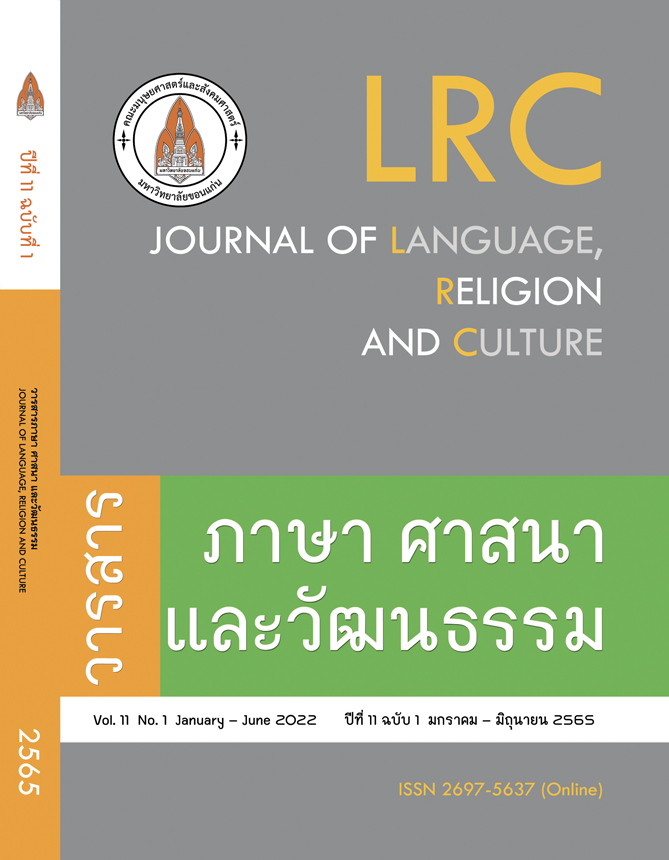ทัศนคติต่อการฝึกสอนของครูฝึกสอนชาวไทยที่เรียนภาษาอังกฤษเป็นภาษาต่างประเทศ
ทัศนคติต่อการฝึกสอนของครูฝึกสอนชาวไทยที่เรียนภาษาอังกฤษเป็นภาษาต่างประเทศ
คำสำคัญ:
ครูฝึกสอน, ทัศนคติของนักศึกษา, การฝึกการเป็นครู, การสอนภาษาอังกฤษ, การศึกษาของครูบทคัดย่อ
การฝึกการเป็นครูเป็นข้อบังคับในการศึกษาของครู ซึ่งครูฝึกสอนจะต้องปฏิบัติการสอนในโรงเรียนจริง วิจัยเรื่องนี้มีวัตถุประสงค์เพื่อสำรวจทัศนคติของนักศึกษาในการฝึกการเป็นครูสอนภาษาอังกฤษชาวไทยที่เรียนภาษาอังกฤษเป็นภาษาต่างประเทศและปัญหาที่เกิดจากการฝึกสอนนั้น ระเบียบวิธีวิจัยเป็นแบบผสมผสานโดยมีการเก็บข้อมูลเชิงปริมาณด้วยวิธีการสุ่มแบบเจาะจงจากกลุ่มประชากรนักศึกษาที่ได้ออกฝึกสอนอย่างน้อยหนึ่งภาคการศึกษาจำนวน 104 คน และมีนักศึกษาอาสาสมัครจำนวน 70 คนที่ตอบกลับแบบสอบถาม (ร้อยละ 72.8) และมีการเก็บข้อมูลเชิงคุณภาพจากการสัมภาษณ์กึ่งโครงสร้างจากนักศึกษาอาสาสมัครจำนวน 16 คน (ร้อยละ 15.4) ผลการวิจัยพบว่านักศึกษาแสดงความคิดเห็นทั้งเชิงบวกและเชิงลบต่อการฝึกสอน โดยนักศึกษาฝึกสอนมีทัศนคติเชิงบวกสูงสุดสองด้านคือ ด้านความสัมพันธ์กับผู้อื่น (ร้อยละ 87.45) และด้านโรงเรียนและหลักสูตร (ร้อยละ 85.10) อาทิเช่น ด้านความสัมพันธ์กับครูพี่เลี้ยง ด้านการจัดการของครูพี่เลี่ยง และด้านการนิเทศโรงเรียน นักศึกษาฝึกสอนรับรู้ด้านเหล่านี้สูงอาจเนื่องมาจากการถูกบ่มเพาะทักษะระหว่างบุคคลและทักษะการปรับตัวก่อนการออกฝึกสอน และยังพบว่านักศึกษาฝึกสอนมีทัศนคติต่ำสุดในสองแง่มุม คือด้านต่อตนเอง (ร้อยละ 76.31)และด้านประสิทธิภาพในการสอนของตนเอง (ร้อยละ 72.20) อาทิเช่น ความพร้อม ความมั่นใจ และประเด็นเกี่ยวกับการสอนอื่น นักศึกษาฝึกสอนรับรู้ด้านเหล่านี้ค่อนข้างต่ำอาจเนื่องมาจากความสามารถทางภาษาอังกฤษไม่เพียงพอ ความรู้วิชาภาษาอังกฤษและการใช้ภาษาอังกฤษจริงตามที่กำหนดไว้ในหลักสูตรไม่เพียงพอ รวมถึงการขาดความพร้อมในการรับมือภาระงานเกินพิกัดของครูและการเกิดโรคระบาดที่ไม่คาดคิดทำให้การฝึกสอนเปลี่ยนไปอย่างสิ้นเชิง
เอกสารอ้างอิง
Archanjo, R., Barahona, M., & Finardi, K. R. (2019). Identity of foreign language pre-service teachers to speakers of other languages: Insights from Brazil and Chile. Colombian Applied Linguistics Journal, 21(1), 71-84.
Atmojo, A. E. P. (2022). Revealing the Secrets of the English Teacher’s Excellent Proficiency. JET (Journal of English Teaching), 8(1), 26-35.
Beyond Band 6 – IELTS Preparation. (2018). What do IELTS Band Scores REALLY mean?. Retrieved from https://beyondband6.com/what-do-ielts-band-scores-really-mean/
Boudersa, N. (2016). The importance of teachers’ training programs and professional development in the Algerian educational context: Toward informed and effective teaching practices. Expériences Pédagogiques, 1(1), 1-14.
Chaiyaphum Rajabhat University. (2019). The Programme Specification of the Bachelor of Education in English (Four years): the Revised Program in 2019. Faculty of Education, Chaiyaphum Rajabhat University.
Hinon, K., & Tansriwong, S. (2015). The Problems of The Practice of Professional Experience Teaching and The Solutions for Future Improvement Faculty of Technical Education King Mongkut’s University of Technology North Bangkok. Technical Education Journal King Mongkut’s University of Technology North Bangkok. 6(1), 159-167.
Husain, M., & Khan, S. (2016). Students’ feedback: An effective tool in teachers’ evaluation system. International Journal of Applied and Basic Medical Research, 6(3), 178.
Indrawati, R. N. A. (2021, May). Applying the Theory of Multiple Intelligences to Develop Interpersonal Skills of Young Learners. In 2nd Annual Conference on Education and Social Science (ACCESS 2020) (pp. 98-95). Atlantis Press.
Jaturanon, W., Kaesan, S., Chanchoengyattachai, S., & Hutaman, K. (2019). A Study of Problems of Pre-Service Teachers Majoring in Chinese Language Teaching, Faculty of Education, Burapha University. e-Journal of Education Studies, Burapha University. 1(3), 43-56.
Khakhai, T., Sala, K., & Prachpreecha, O. (2019). A Study of the Problems in Teaching Practicum of Diploma Students Studying in the Faculty of Education, Vongchavalitul University. Sikkha Journal of Education. 6(2), 33-46.
Khlayphan, S. (2014). Problems and Guided Development in Professional Practices of Teacher Student from Institutes of Physical Education Chonburi Campus. Journal of Educational Administration Burapha University. 8(1), 63-76.
Lewis, M. E. (2014). Early childhood education pre-service teachers’ concepts of play (Doctoral dissertation, Oklahoma State University).
Llerena-Izquierdo, J., & Ayala-Carabajo, R. (2021, February). University teacher training during the COVID-19 emergency: the role of online teachinglearning tools. In International Conference on Information Technology & Systems (pp. 99-90). Springer, Cham.
Mahawiro, P.S. (2018). The problem-solving approach in teaching professional experience of students of Education Program in Teaching English, Mahamakut Buddhist University, Lanna Campus. MBU Education Journal: Faculty of Education Mahamakut Buddhist University. 6(1), 76-94.
Mala, D. (2018, November 5). Thai English proficiency drops. Bangkok Post. Retrieved from https://www.bangkokpost.com/thailand/general/1570042/thai-english-proficiency-drops
Mtika, P. (2011). Trainee teachers’ experiences of teaching practicum: Issues, challenges, and new possibilities. Africa Education Review, 8(3), 551-567.
Obaidul Hamid, M. (2010). Globalisation, English for everyone and English teacher capacity: Language policy discourses and realities in Bangladesh. Current Issues in Language Planning, 11(4), 289-310.
Office of the Higher Education Commission. (2014). Manual for The Internal Quality Assurance for Higher Education Institutions : Office of the Higher Education Commission (OHEC). Parbpim Ltd., Part. Office of the Permanent Secretary, Ministry of Higher Education, Science, Research and Innovation. (2021, July 7). The Submission of the Documentary Evidence for Certified Local Teachers. Retrieved from https://www.ops.go.th/main/index.php/news-service/announcement/3535-2561-2-2560
Pillai, M. D. S. (2012). The Importance of Teacher Training in Professional Colleges. In Conference Paper.
Piske, F. H. R., Stoltz, T., Guérios, E., De Camargo, D., Vestena, C. L. B., De Freitas, S. P., ... & Santinello, J. (2017). The Importance of Teacher Training for Development of Gifted Students’ Creativity: Contributions of Vygotsky. Online Submission, 8(1), 131-141.
Post Reporters. (2018, February 2). Rajabhat enrolments ‘shrinking’. Retrieved from https://www.bangkokpost.com/thailand/general/1406186/rajabhat-enrolments-shrinking
Post Reporters. (2020, November 27). Thai English proficiency drops. Bangkok Post. Retrieved from https://www.bangkokpost.com/thailand/general/2026031/english-skills-drop-again.
Pozo-Rico, T., Gilar-Corbí, R., Izquierdo, A., & Castejón, J. L. (2020). Teacher training can make a difference: tools to overcome the impact of COVID-19 on primary schools. An experimental study. International Journal of Environmental Research and Public Health, 17(22), 8633.
Reungpan, N. (2012). The Practice of Professional Training in Southern Rajabhat University. Retrieved from http://wb.yru.ac.th/handle/yru/135.
Srisawasdi, N., & Panjaburee, P. (2019). Implementation of game-transformed inquiry-based learning to promote the understanding of and motivation to learn chemistry. Journal of Science Education and Technology, 28(2), 152–164.
Sundararasan, P. G. K. T. (2019, July). Young Learners and its Interpersonal Relationships in Learning. Cognitive, Psychological and Behavioural Perspectives in Education Conference. Karaikudi, Tamilnadu: Alagappa University.
Teacher’s Council of Thailand. (2021, February 24). List of educational institutions accredited by the Teacher’s Council of Thailand. Retrieved from https://www.ksp.or.th/ksp2018/cert-stdksp
Thadphoothon, J. (2017). English language competence of Thai school teachers. In International Conference on Economics and Management Innovations (ICEMI) (Vol. 1, No. 1, pp. 156-154).
Yaila-o, C., Manaswas, K., & Pathumcharoenwattana, W. (2017). Confirmatory Factors Analysis of Enhance Collaborative Working Skills of Personnel in Small and Medium Enterprises Using Concept of the Cultural Intelligence and Stephen R. Covey’s 7 Habits. Journal of Education Studies, 45(4), 37-55.
ดาวน์โหลด
เผยแพร่แล้ว
รูปแบบการอ้างอิง
ฉบับ
ประเภทบทความ
สัญญาอนุญาต
ลิขสิทธิ์ (c) 2022 วารสารภาษา ศาสนา และวัฒนธรรม

อนุญาตภายใต้เงื่อนไข Creative Commons Attribution-NonCommercial-NoDerivatives 4.0 International License.







